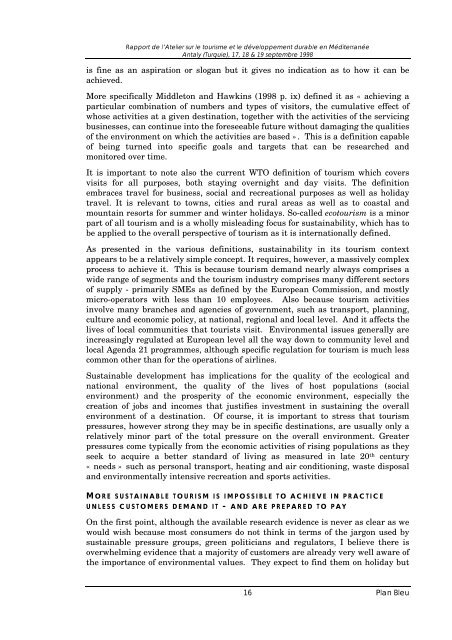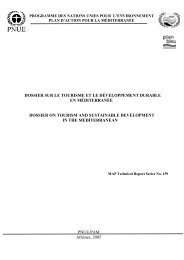MEDITERRANEAN ACTION PLAN
MEDITERRANEAN ACTION PLAN
MEDITERRANEAN ACTION PLAN
You also want an ePaper? Increase the reach of your titles
YUMPU automatically turns print PDFs into web optimized ePapers that Google loves.
Rapport de l’Atelier sur le tourisme et le développement durable en Méditerranée<br />
Antaly (Turquie), 17, 18 & 19 septembre 1998<br />
is fine as an aspiration or slogan but it gives no indication as to how it can be<br />
achieved.<br />
More specifically Middleton and Hawkins (1998 p. ix) defined it as « achieving a<br />
particular combination of numbers and types of visitors, the cumulative effect of<br />
whose activities at a given destination, together with the activities of the servicing<br />
businesses, can continue into the foreseeable future without damaging the qualities<br />
of the environment on which the activities are based » . This is a definition capable<br />
of being turned into specific goals and targets that can be researched and<br />
monitored over time.<br />
It is important to note also the current WTO definition of tourism which covers<br />
visits for all purposes, both staying overnight and day visits. The definition<br />
embraces travel for business, social and recreational purposes as well as holiday<br />
travel. It is relevant to towns, cities and rural areas as well as to coastal and<br />
mountain resorts for summer and winter holidays. So-called ecotourism is a minor<br />
part of all tourism and is a wholly misleading focus for sustainability, which has to<br />
be applied to the overall perspective of tourism as it is internationally defined.<br />
As presented in the various definitions, sustainability in its tourism context<br />
appears to be a relatively simple concept. It requires, however, a massively complex<br />
process to achieve it. This is because tourism demand nearly always comprises a<br />
wide range of segments and the tourism industry comprises many different sectors<br />
of supply - primarily SMEs as defined by the European Commission, and mostly<br />
micro-operators with less than 10 employees. Also because tourism activities<br />
involve many branches and agencies of government, such as transport, planning,<br />
culture and economic policy, at national, regional and local level. And it affects the<br />
lives of local communities that tourists visit. Environmental issues generally are<br />
increasingly regulated at European level all the way down to community level and<br />
local Agenda 21 programmes, although specific regulation for tourism is much less<br />
common other than for the operations of airlines.<br />
Sustainable development has implications for the quality of the ecological and<br />
national environment, the quality of the lives of host populations (social<br />
environment) and the prosperity of the economic environment, especially the<br />
creation of jobs and incomes that justifies investment in sustaining the overall<br />
environment of a destination. Of course, it is important to stress that tourism<br />
pressures, however strong they may be in specific destinations, are usually only a<br />
relatively minor part of the total pressure on the overall environment. Greater<br />
pressures come typically from the economic activities of rising populations as they<br />
seek to acquire a better standard of living as measured in late 20 th century<br />
« needs » such as personal transport, heating and air conditioning, waste disposal<br />
and environmentally intensive recreation and sports activities.<br />
M ORE SUSTAINABLE TOURISM IS IMPOSSIBLE TO ACHIEVE IN PRACTICE<br />
UNLESS CUSTOMERS DEMAND IT - AND ARE PREPARED TO PAY<br />
On the first point, although the available research evidence is never as clear as we<br />
would wish because most consumers do not think in terms of the jargon used by<br />
sustainable pressure groups, green politicians and regulators, I believe there is<br />
overwhelming evidence that a majority of customers are already very well aware of<br />
the importance of environmental values. They expect to find them on holiday but<br />
16<br />
Plan Bleu
















